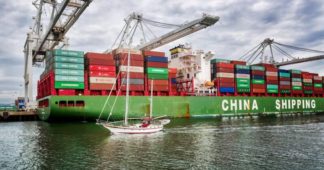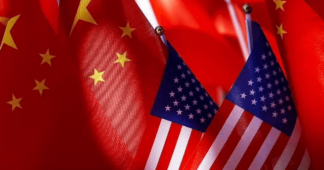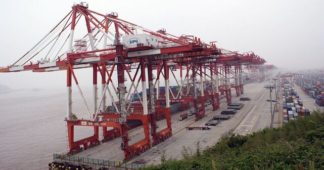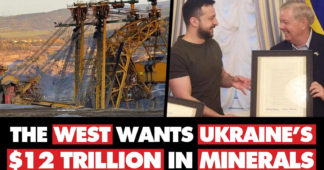China’s Rare Earth Restrictions Could Send US Nuclear Industry Into Meltdown
By Ilya Tsukanov
April 9, 2025
The new restrictions are a masterstroke that will propel the Asian nation’s nuclear industry forward as the US stagnates. Renowned Russian nuclear expert Alexei Anpilogov explains why.
China’s response to Trump’s tariffs includes new restrictions on the export of critical elements. Effective immediately, exports containing strategic minerals have to apply for a Chinese Ministry of Economy export license, including details on their end use.
Painful Blow
Gadolinium and dysprosium, two rare earths used along with zirconium in modern fuel assemblies, are an effective Chinese monopoly. 99% of their production is concentrated in a single plant outside Shanghai, Anpilogov says.
Installed assemblies at US plants will last 12-24 months, the expert estimates. After that, if the US can’t find new sources through third parties, the quality of its assemblies will drop.
No Alternative
Restoring production in the US would be extremely tricky, according to the observer.
“It’s a matter not of months, but of years, including construction, debugging of production, and tech adjustments.”
“The last lanthanide-separating centrifuge in the US was decommissioned in 1996. The people who worked on it are either retired, or you can read about their lives on a memorial plaque somewhere,” Anpilogov points out.
Boon to China’s Atomic Ambitions
The majority of the world uses 3 and 3+ gen reactor tech. Russia and China are currently the only ones widely experimenting with 4th gen reactors – including BN, Brest and SVBR, and an array of Chinese research reactors.
The rare earth restrictions response to US tariffs could allow China and Russia to “very seriously overtake the US,” Anpilogov says.
That’s because along with Europe, America is stuck with third-gen reactors and cannot really produce replicable results on its 4th gen experimentation.
See China’s Rare Earth Restrictions Could Send US Nuclear Industry Into Meltdown
China’s Rare Metal Ban Could Bring US Military-Industrial Complex to a Grinding Halt: Here’s Why
By Ilya Tsukanov
April 9, 2025
Beijing’s response to Trump’s tariffs includes new restrictions on the export of critical elements. The move could prove extremely painful for the US.
“China’s sanctions on Lockheed Martin and Raytheon,” and now restrictions on “rare earths and dual-use tech, disrupt their supply chains, heavily dependent on Chinese resources,” says Hong-Kong-based financial analyst Angelo Giuliano.
The restrictions will cause defense production costs to “soar,” and mean delays in the production of advanced, rare-earth-dependent equipment like aircraft and missiles, Giuliano predicts. The US is simply “unprepared to ditch China as a trade partner” in this sector.
Senior ex-DoD security policy analyst Michael Maloof believes that while the move will undoubtedly “generate a temporary dislocation,” the US will look to unlock rare earths potential elsewhere (Latin America, Ukraine, perhaps even Russia) while building up its domestic mining potential.
“But it’s going to take time. It’s not an overnight thing,” Maloof emphasized.
What Resources are at Stake?
Effective immediately, products containing the following minerals must apply for a Chinese Ministry of Economy export license, including details on their endpoint use:
- Scandium: Strategic additive for aluminum alloys. Restrictions will affect aviation and rocketry, says rare earths expert Ruslan Dimukhamedov. Scandium is needed “where extreme strength and low weight are required,” no matter the cost.
- Dysprosium: Used in neodymium magnets, allowing them “to be much more temperature-resistant,” preventing demagnetization at higher temperature ranges, Dimukhamedov, chairman of the Russian Association of Producers and Consumers of Rare and Rare Earth Metals, explained.
- Samarium: Needed for samarium-cobalt magnets, an even more temperature-resistant magnet “used in oil wells or defense applications, where a missile flies and heats up in the air, for example,” as well as electric motors used in aerospace.
- Gadolinium: Critical in the civilian nuclear industry “as a burnable additive in nuclear fuel that improves the lifespan of uranium in the reactor and the completeness of its burnup,” Dimukhamedov says.
- Terbium: Used in phosphors for an array of lighting applications, including spotlights, matrices, displays, monitors, and smartphones.
- Yttrium: Used to produce aviation and aerospace-grade ceramics, including “yttria-stabilized zirconium ceramics” and “refractories for engines and heat protection for space” applications, Dimukhamedov says.
- Lutetium: Key chemical element used in modern lasers.
China is a ‘Monopolist’ in African Rare Metals Market, While US, West Lose Ground – Analyst
By Svetlana Ekimenko
Mars 22, 2025
As the battle for tech metals intensifies, China controls about 70% of global rare earth mineral output and supply chains. Beijing also holds a strong foothold in many African countries rich in these resources, thanks to the Belt and Road Initiative (BRI), pundits previously told Sputnik.
Beijing is demonstrating a smart and innovative approach to cooperation in Africa, while American influence on the continent “has declined at the political, military and intelligence levels,” Algerian political analyst Salim Bou Zidi told Sputnik.
The US and other Western countries are gradually losing the African market not only in rare metals, “but also in energy and direct investment in the agricultural sector,” he noted.
2/7 🔬 Rare earth elements (REEs) are 17 critical metals used in electronics, AI, space tech, and weapons.
Key REEs: neodymium, dysprosium, terbium & more. Russia holds 28.5M tons of REE reserves, including in Tomtor (Yakutia), Lovozero (Kola Peninsula), Donbass. 🏔⚒️ pic.twitter.com/BA0jGfZN2L
— Sputnik (@SputnikInt) February 25, 2025
The reason why China has become a “monopolist” in the African rare metals market is because it “does not interfere in domestic politics and does not impose its conditions on African countries,” the pundit pointed out.
Furthermore, Beijing offers “significant loans and lucrative deals where minerals are obtained in exchange for infrastructure construction,” the expert noted.
China dominates rare earth metal production, veteran Asia-Pacific affairs expert Thomas Pauken II previously told Sputnik, adding that Beijing “has a firm foothold in many African countries through the Belt and Road Initiative (BRI).”
See China is a ‘Monopolist’ in African Rare Metals Market, While US, West Lose Ground – Analyst
We remind our readers that publishing articles on our site does not mean we endorse their content. Our policy is to publish anything we find interesting, to help readers form their own opinions. We sometimes publish articles we strongly disagree with, as we believe it’s important for readers to be exposed to the widest possible range of viewpoints.











